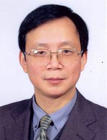

Hou Jianguo (1959- ) is a native of Pingtan, Fujian Province. Hou is a physical chemist. He received his doctorate of Condensed Matter Physics from University of Science and Technology of China (USTC) in 1989. He served as professor of USTC since 1995 and as director of Key Laboratory of Structural Analysis of Chinese Academy of Sciences (CAS) and of Physical Chemistry Science Center of USTC. He was elected as academician of CAS in 2003 and of the Third World Academy of Sciences in 2004. He served as executive vice director of State Laboratory of Microscale Matter Science from 2004. Since 2008, he has been serving as President of USTC.
Hou focused his research on surface physics and chemistry field. He made a series of achievements in preparation and characterization of nano-materials and nano-structures, self-assembly of molecular and nano-structures, characterizing and controlling quantum states in nano-systems, scanning tunneling microscopy study of nano-materials and nano-structures, and so on. Hou successfully characterized and manipulated adsorbed single molecules on surface and their electronic states by the experimental and theoretical methods. He combined high-resolution imaging technology and local density functional theoretical simulation, and established a method to identify the orientational structures of adsorbed single molecules and related electronic states, which shed light on future design and production of nano-materials and single molecular devices. Furthermore, he has been trying to tune the physical properties of nanostructures at a single molecular level, such as electronic states, charge transfer, transport property, etc. He controlled magnetic property of single cobalt phthalocyanine (CoPc) molecules through a select-bonding-chemistry method, and successfully made it possible to control spin state of the single CoPc molecules for the first time. He has published about over 150 papers on domestic and foreign highly-recognized academic journals, such as Nature, Science, Journal of the American Chemical Society, Physical Review Letters. In recognition of his outstanding contributions, he was given State Outstanding Youth Science Foundation Award, CAS Natural Sciences Award, First Class (1997), Qiushi Award for "Outstanding Young Scientist" (1999), China Association for Instrumental Analysis (CAIA) Award, Special Class (2001), "Asian Achievement Award" by Oversea Chinese Physics Association (2002), State Natural Sciences Award, Second Class (2005), Ho Leung Ho Lee Award for Science and Technology Advancement (2008) and so on.